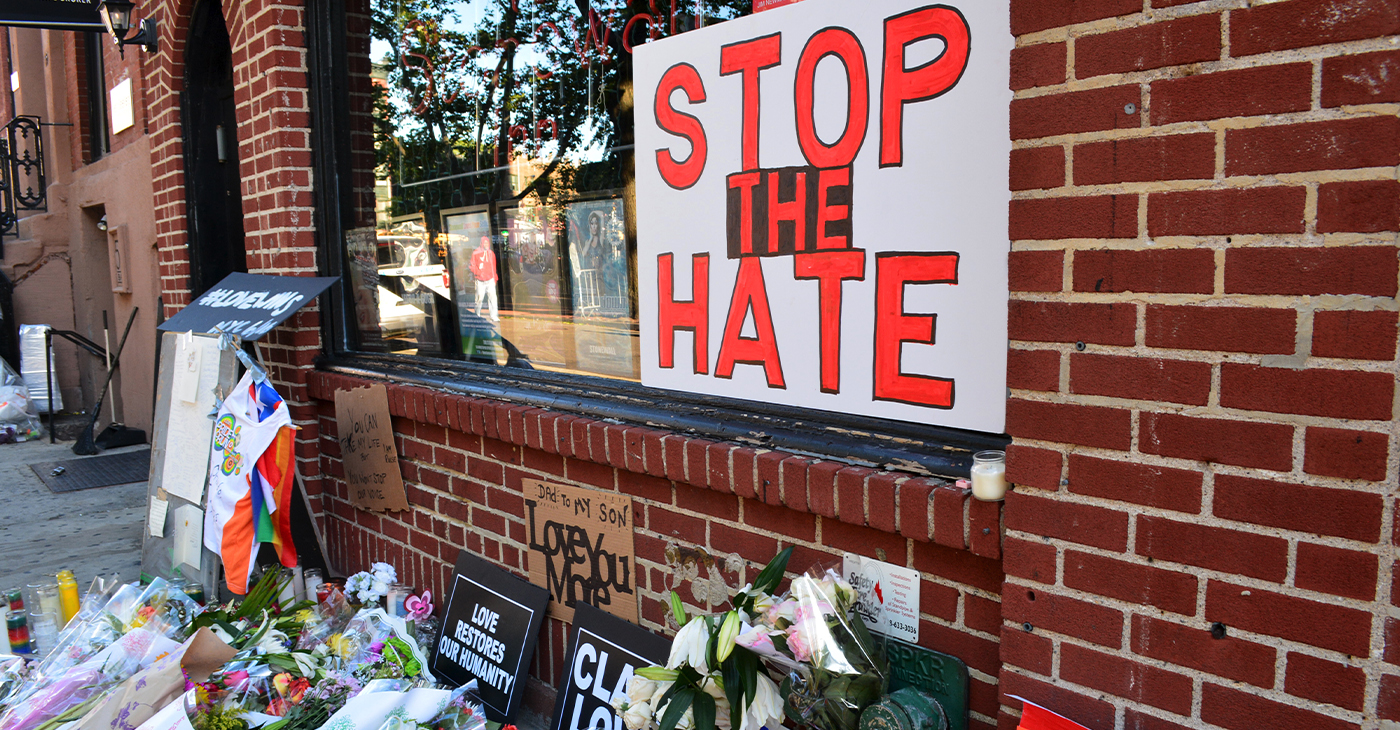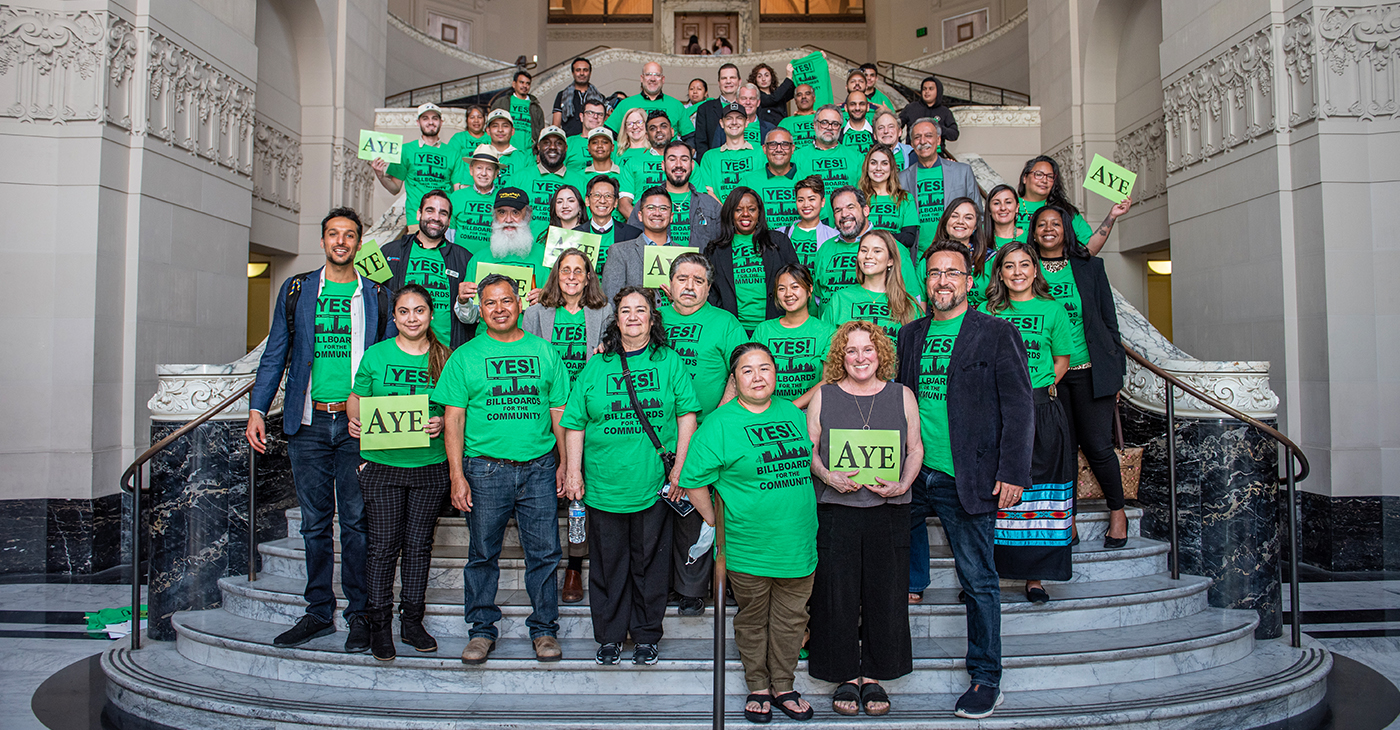Activism
To Address Rising Hate, More Focus on Prevention and Crime It Triggers
According to the FBI, over 10,000 people nationally reported to law enforcement in 2021 that they were victims of hate crimes because of their race or ethnicity, sexual orientation, gender, religion or disability. Hate is on the rise in California. For example, there was a 6% increase in hate crimes and hate incidents in Orange County from 2020 to last year.

By McKenzie Jackson | California Black Media
Although Black people are still primary victims of hate crimes and hate speech, hate speech of any kind is hurtful at the least and condones activity that can be dangerous.
Last month, two Black icons engaged in what was considered hateful speech.
Hip hop icon and fashion designer Kanye West wore a black, long-sleeved shirt with “WHITE LIVES MATTER” emblazoned on the backside in white block letters at his Yeezy fashion show in Paris on October 3, kicking off a national conversation on racism that intensified four days later when West broadcast on Twitter that he was going to go “death con 3 On JEWISH PEOPLE” in a since-deleted tweet.
Then, on October 27, NBA player Kyrie Irving posted a link on Twitter to the 2018 film “Hebrew to Negroes: Wake Up Black America,” and shared a screenshot on Instagram of the film’s rental page on Amazon.
The film, directed by Ronald Dalton Jr., who also wrote a 2014 book under the same name, contains antisemitic tropes disparaging Jewish people. The film also claims the Holocaust never happened.
For both men, the national outcry led to swift censure.
West, who changed his legal name to Ye, was barred from Twitter and Instagram and lost his partnership with Adidas. He reluctantly apologized on October 19.
Irving was suspended for several games by the Brooklyn Nets for refusing to say he has no antisemitic beliefs and Nike suspended his shoe contract. Irving has apologized for his social media actions, and discussions on biased hate in the U.S. have been heightened.
Los Angeles Lakers star Lebron James said on November 6 that Irving was in the wrong.
“Me, personally, I don’t condone any hate of any kind,” James told the media. “To any race. To Jewish communities, to Black communities, to Asian communities.”
According to the FBI, over 10,000 people nationally reported to law enforcement in 2021 that they were victims of hate crimes because of their race or ethnicity, sexual orientation, gender, religion or disability.
Hate is on the rise in California. For example, there was a 6% increase in hate crimes and hate incidents in Orange County from 2020 to last year.
Of the 398 bias-motived activities, Black people were the target of 25 incidents and 16 crimes, according to the “2021 Orange County Hate Crimes Report” released by Orange County Human Relations Council on September 15.
Don Han, the Council’s director of operations, said the trend is concerning.
“Orange County has 2% African Americans in the demographic, so a very small percentage, but in terms of hate crimes they are within the top three,” Han said. “That speaks volumes for us, and that is something very intentional for us in how we support the community here in Orange County, so that people can feel that they belong.”
A hate incident is an action or behavior motivated by hate but legally protected by the First Amendment right to freedom of expression. A hate crime is an illegal action committed against an individual, group, or property motivated by the victim’s real or perceived protected social group.
Overall, there were 97 documented hate crimes in Orange County and 301 reported hate incidents a year ago. A large swath of the incidents in 2021 — 153, a 164% increase from 2020 — were against Asian/Pacific Islanders. Sixteen crimes were committed against gay men, while 26 of the crimes had an unknown bias.
The rise in hate crimes and incidents in the Southern California county is part of a broader pattern around the Golden State.
A report released by California Attorney General Rob Bonta in June revealed hate crimes inspired by racism and homophobia resulted in a 33% uptick in reported incidents in the state in 2021.
Hate crimes against Blacks were the most prevalent, according to the state report. There were 513 crimes committed against Blacks in 2021, 13% more than the 456 in 2020. Overall, there were 1,763 crimes reported in 2021. Crimes spurred by sexual orientation bias jumped from 205 in 2020 to 303 in 2021.
Crimes involving religion bias increased from 180 in 2020 to 218 last year. Crimes involving a gender bias decreased to 54 in 2021 from 62 in 2020.
Gov. Gavin Newsom signed Assembly Bill 2282, meant to crack down on hate crimes and protect minority communities in California, on September 18. The bill equalizes and strengthens penalties for using hate symbols and bolsters security for targeted religious and community-based nonprofits.
“California will not tolerate violence terrorizing any of our communities, and this measure updates state law to punish the use of universally recognized symbols of hate equally and to the fullest extent of the law,” Newsom said. “California will continue to lead the fight to stamp out hate and defend those under attack for who they are, how they identify, or what they believe in.”
The legislation brings parity to penalties for burning crosses and using swastikas and nooses. Using a noose as a hate symbol currently has the lightest penalty of the three while cross-burning is the most highly penalized. People who use any of the three symbols of hate will be subject to the strongest of these criminal penalties under the signed bill.
Assemblymember Rebecca Bauer-Kahan (D-Orinda), AB 2282’s author, said hate symbols are violent and terrifying.
“With hate crimes increasing across the state, it is critical to recognize the power and destructiveness of these symbols, and restrict their use equally,” she said.
On August 21 Krishnan Jayaraman, who is Indian, was in a Taco Bell in Fremont when Singh Tejinder hurled anti-Hindu comments and racists slurs at him. Tejinder used the N-word several times, called Jayaraman a “dirty Hindu,” and seemingly twice spit at Jayaraman.
Tejinder, who is Asian/Indian, was charged by Fremont police with a hate crime in violation of civil rights, assault and disturbing the peace by offensive language.
Han of the OC Human Relations Council said his group attempts to prevent hate activities in the county by organizing educational programs with schools and other organizations.
“We work with different communities on hate crime prevention and on how to report a hate crime and hate incidents,” he said. “We work with law enforcement. If they are responding to a hate crime, and the victim speaks a language other than English, we are able to connect them with organizations that we partner with to make communication possible.”
Reena Hajat Carroll, executive director of the California Conference for Equality and Justice (CCEJ) in Long Beach, said racism and bigotry are big problems in California.
CCEJ battles prejudice via workshops and trainings in schools, and with its restorative youth diversion program, meant to be an alternative to the juvenile justice system.
“CCEJ’s work with young people is key,” said Carroll. “It creates a generation of people who know how important it is for us all to fight bias, bigotry, and racism. No matter what age, no matter what race, etc. We have to all be in this together because the problem is too pervasive.”
Han said the best way to prevent hate activities is education and for to people get to know each other.
“We have created a safe space to have conversations, so hopefully those conversations will create common ground,” he said. “If you know someone as a person or another human being, when you truly know me and we know each other, it’s harder to have bias-motivated feelings.”
For more information on hate crimes and resources victims, visit https://oag.ca.gov/hatecrimes.
This report was supported in whole or in part by funding provided by the State of California, administered by the California State Library.
Activism
Oakland Post: Week of July 24 – 30, 2024
The printed Weekly Edition of the Oakland Post: Week of July 24 – 30, 2024

To enlarge your view of this issue, use the slider, magnifying glass icon or full page icon in the lower right corner of the browser window. ![]()
Activism
Oakland Post: Week of July 17 -23, 2024
The printed Weekly Edition of the Oakland Post: Week of July 17 -23, 2024

To enlarge your view of this issue, use the slider, magnifying glass icon or full page icon in the lower right corner of the browser window. ![]()
Activism
Community Celebrates Historic Oakland Billboard Agreements
We, the Oakland Billboard Economic Development Coalition, which includes Oakland’s six leading community health clinics, all ethnic chambers of commerce, and top community-based economic development organizations – celebrate the historic billboard agreements approved last year by the Oakland City Council. We have fought for this opportunity against the billboard monopoly, against Clear Channel, for five years. The agreements approved by Council set the bar for community benefits – nearly $70 Million over their lifetime, more than 23 times the total paid by all previous Clear Channel relocation agreements in Oakland combined.

Grand Jury Report Incorrect – Council & Community Benefit
We, the Oakland Billboard Economic Development Coalition, which includes Oakland’s six leading community health clinics, all ethnic chambers of commerce, and top community-based economic development organizations – celebrate the historic billboard agreements approved last year by the Oakland City Council. We have fought for this opportunity against the billboard monopoly, against Clear Channel, for five years. The agreements approved by Council set the bar for community benefits – nearly $70 Million over their lifetime, more than 23 times the total paid by all previous Clear Channel relocation agreements in Oakland combined.
Unfortunately, a recent flawed Grand Jury report got it wrong, so we feel compelled to correct the record:
- Regarding the claim that the decision was made hastily, the report itself belies that claim. The process was five years in the making, with two and a half years from the first City Council hearing to the final vote. Along the way, as the report describes, there were multiple Planning Commission hearings, public stakeholder outreach meetings, a Council Committee meeting, and then a vote by the full Council. Not only was this not hasty, it had far more scrutiny than any of the previous relocation agreements approved by the City with Clear Channel, all of which provide 1/23 of the benefits of the Becker/OFI agreements approved by the Council.
- More importantly, the agreements will actually bring millions to the City and community, nearly $70M to be exact, 23 times the previous Clear Channel relocation agreements combined. They certainly will not cost the city money, especially since nothing would have been on the table at all if our Coalition had not been fighting for it. Right before the decisive City Council Committee hearing, in the final weeks before the full Council vote, there was a hastily submitted last-minute “proposal” by Clear Channel that was debunked as based on non-legal and non-economically viable sites, and relying entirely on the endorsement of a consultant that boasts Clear Channel as their biggest client and whose decisions map to Clear Channel’s monopolistic interests all over the country. Some City staff believed these unrealistic numbers based on false premises, and, since they only interviewed City staff, the Grand Jury report reiterated this misinformation, but it was just part of Clear Channel’s tried and true monopolistic practices of seeking to derail agreements that actually set the new standard for billboard community benefits. Furthermore, our proposals are not mutually exclusive – if Clear Channel’s proposal was real, why had they not brought it forward previously? Why have they not brought it forward since? Because it was not a real proposal – it was nothing but smoke and mirrors, as the Clear Channel’s former Vice President stated publicly at Council.
Speaking on behalf of the community health clinics that are the primary beneficiaries of the billboard funding, La Clinica de la Raza CEO Jane Garcia, states: “In this case, the City Council did the right thing – listening to the community that fought for five years to create this opportunity that is offering the City and community more than twenty times what previous billboard relocation agreements have offered.”
Oakland Billboard Economic Development Coalition
| Native American Health Center | La Clínica de la Raza | West Oakland Health Center |
| Asian Health Services | Oakland LGBTQ Center | Roots Community Health Center |
| The Unity Council | Black Cultural Zone | Visit Oakland |
| Oakland African American Chamber of Commerce | Oakland Chinatown Chamber of Commerce | Oakland Vietnamese Chamber of Commerce |
| Oakland Latino Chamber of Commerce | Building Trades of Alameda County | (partial list) |
-

 Arts and Culture3 weeks ago
Arts and Culture3 weeks agoRooted in Tradition: The Intricate History of Black Hair Braiding
-

 Bay Area4 weeks ago
Bay Area4 weeks ago“I Will Not Be Bullied,” Says Oakland Mayor Sheng Thao
-

 Bay Area2 weeks ago
Bay Area2 weeks agoPG&E Increases Rates While Bay Area Households Are Struggling to Stay Afloat
-

 Business3 weeks ago
Business3 weeks agoGov Newsom: Raising Fast Food Minimum Wage to $20 Pays Off as Jobs Multiply in Industry
-

 Activism4 weeks ago
Activism4 weeks agoOpponents of Mayor Sheng Thao Are Calling on Her to Resign Following FBI Raid
-

 Community1 week ago
Community1 week agoHundreds Come to Jehovah’s Witnesses’ Assembly Hall for Three-Day Program of ‘Good News’ in Fremont
-

 Bay Area2 weeks ago
Bay Area2 weeks agoJuneteenth Mass Shooting Suspect Charge with Multiple Counts of Felony Assault by Alameda County DA Pamela Price
-

 Activism4 weeks ago
Activism4 weeks agoOakland Coliseum Sale to AASEG: A Model for Community Development and Inclusion






















































